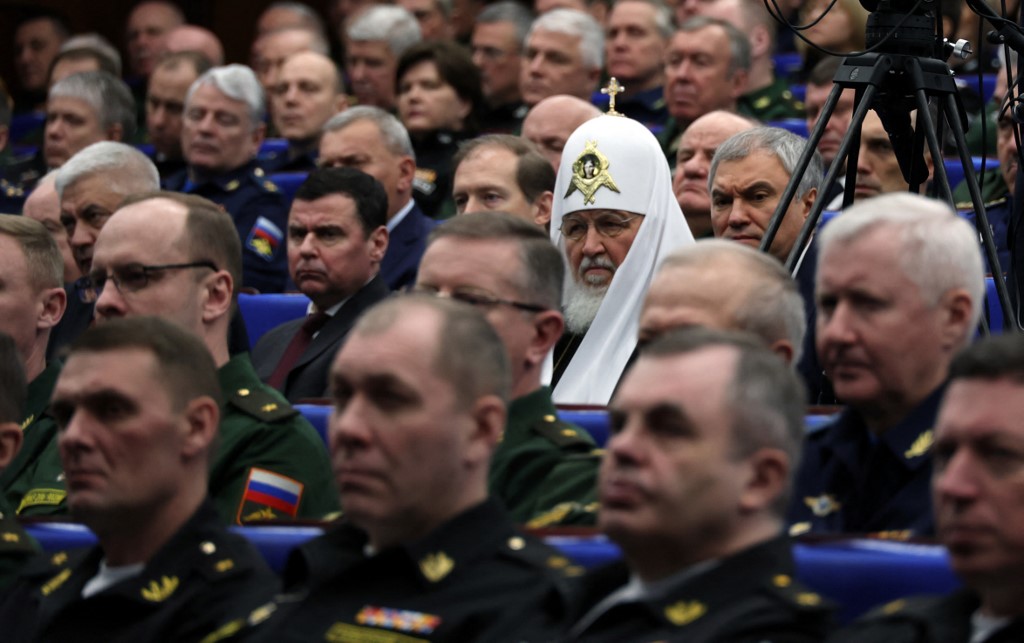
MOSCOW, Russia (AFP) — Russian Orthodox Patriarch Kirill, a powerful ally of President Vladimir Putin, is embracing the rhetoric of the mediaeval crusades in urging support for Moscow’s offensive in eastern Ukraine.
When Pope Urban ordered the first crusade to the Middle East in 1095, he told Christians to rise up and defend fellow believers, promising that their sins would be wiped away.
Nearly 10 centuries later, Kirill has called on believers to support pro-Russian “brothers” during Moscow’s offensive in eastern Ukraine.
In a sermon in September, he said that dying in Ukraine “washes away all sins”.
As humiliating military setbacks for Russia in Ukraine pile up, authorities in Moscow seem increasingly willing to depict the campaign in religious terms.
Keen to ensure public support, Putin declared during his midnight address on New Year’s Eve that “moral, historical rightness is on our side”.
He had initially said that the fellow Orthodox Christian nation needed to be “demilitariZed” and “de-Nazified”.
But more than 10 months into Moscow’s offensive, Russian authorities, military commanders and propagandists aim to depict the conflict as a battle against the decadent West.
In early November, former president Dmitry Medvedev said that Russia faced an existential threat and that the “sacred goal” was to fight the satanic West.
“We are listening to the words of the Creator in our hearts and obeying them,” Medvedev, who serves as deputy head of Russia’s Security Council, wrote on messaging app Telegram.
“The goal is to stop the supreme ruler of Hell, whatever name he uses —- Satan, Lucifer or Iblis.”
– ‘Russia will never be defeated’ –
Dozens of Orthodox priests have been sent to the front to support Russian troops.
Archpriest Svyatoslav Churkanov said that such missions help guide soldiers in their duty on the battlefield.
“The priest does not allow them to lose their souls, to descend into inhumanity even if the circumstances encourage this,” he told AFP.
“You cannot loot, you cannot harm civilians,” he added.
The cleric said he did not doubt the goals of the offensive, adding that in Ukraine, Russia was defending “traditional values”.
“In Ukraine, even in wartime conditions, they are holding gay parades to show that they share Western values,” he claimed.
Several Orthodox clerics have died in Ukraine including Mikhail Vasilyev, who posthumously received from Putin the Hero of Russia award, the country’s top honor.
For Nikita Astakhov, artistic director of Glas (Voice), a Moscow theatre that promotes Orthodox values, rising up against evil has always been Russia’s mission, be it a battle against Napoleon in 1812 or the Great Patriotic War of 1941-1945, as World War II is known in the country.
“Russia will never be defeated as long as more than half of Russians are Orthodox,” Astakhov told AFP.
– ‘Fratricidal war’ –
The offensive has deepened a rift between the Russian and Ukrainian Orthodox churches. But even in Russia, not every cleric supports the rhetoric of the Moscow patriarchate.
Andrei Kordochkin, an Orthodox priest based in Madrid, said the words come straight from the Middle Ages.
“This is exactly the terminology that Pope Urban used blessing the crusade,” Kordochkin said.
“We can be nostalgic for the Middle Ages, but it is impossible to return there,” he added. “War as a form of murder cannot have any spiritual meaning at all.”
Kordochkin was among nearly 300 Russian Orthodox clerics who signed an open letter urging authorities to end the “fratricidal war” in Ukraine.
Kordochkin said “many more” people agreed with the letter’s message but were unable to sign it for various reasons.
“We bitterly think about the chasm that our children and grandchildren in Russia and Ukraine will have to overcome in order to start being friends with each other again, respect and love each other,” the petition said.
Several signatories of the letter have been sanctioned by the patriarchy, said one priest, requesting anonymity to speak candidly.
Some of the clerics were moved to other parishes and replaced by priests loyal to the Kremlin, he said.
“One priest served 30 years in his parish and was then transferred to serve elsewhere,” he added, calling the Russian offensive a “catastrophe”.
© Agence France-Presse








